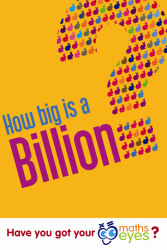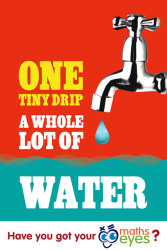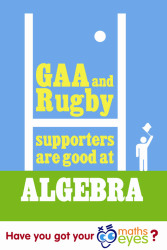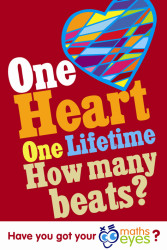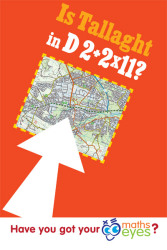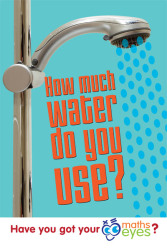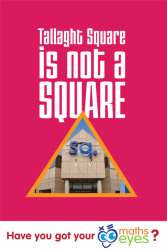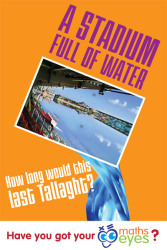Have you got Maths Eyes’ is a successful initiative from ‘Looking at Tallaght with Maths Eyes’ that took place in June 2011. Check out the posters to see if you have your maths eyes!
For more information visit: www.haveyougotmathseyes.com
Billion
The word billion is now commonly used in the newspaper and on the radio and TV. But how much is a billion? In the maths world a billion is one thousand million written as 1,000,000,000.
Most of us cannot imagine how big this number is. The real world can help. Think about time. It takes just under 17 minutes for 1000 seconds to pass. It takes 12 days for a million seconds to pass. However it takes nearly 32 years for a billion seconds to pass. A
Billion is a really big number!
A Tiny Drop a Whole lot of Water
In the real world many homes in Tallaght have a tap that drips a little bit of water. The tap is never fixed because its ‘only a little bit of water’. However the Maths world reveals that a tiny drip adds up to a whole lot of water. Each tiny drip wastes a staggering ten thousand litres of water in a year.
We drink about 2 litres of water a day so it would take about fourteen years for one person to drink this much water and that’s only one leaking tap in one house. There are over ninety thousand houses in Tallaght, so huge amounts of water is wasted because a dripping tap has not been fixed. Do your bit for water conservation ‘FIX the DRIP’.
Facebook Poster
How often have you seen the statement “People you may Know” on your Facebook page? Sometimes you know the people listed while at other times you never heard of them. But how is it that a social networking site can make up a list of people that you may know in the real world? The answer to this lies in mathematics.
Facebook uses the maths world to connect you with people in the real world. It uses the mathematics of probability (also called chance) to create this list. By looking at friends of friends Facebook is able to identify patterns. From these patterns Facebook can compile a list of people you may know. For example if Mary’s list of friends on Facebook includes Jack, Susan and Tom; and Jack, Susan and Tom are all friends with Lucy then Facebook works out that the chances are that Mary may also know Lucy so Lucy is added to the list of “People she may know”. Of course there is also a chance that Lucy and Mary have never met each other but this is the risk that Facebook takes.
GAA and Rugby Supporters
If you are a supporter of GAA or rugby you probably keep track of the scores during a match and work out from the number of goals and points (GAA) or tries, conversions, penalties or drop goals (rugby) scored. In this way you know who is winning and what the final scores are. To work out the score you have to allocate the right number of points to goals, tries or conversions add them together and work out the total score.
In the maths world this kind of calculation is called linear algebra. Players do similar calculations when they work out tactics during a game. Many GAA games have been won in the final seconds when a player has gone for a goal rather than take an easier point to get his team ahead. Just think how did Ronan O’Gara know to attempt a drop goal in the dying minutes of the Grand Slam decider in 2009?
Heartbeat
The rate our heat beats depends on how old we are, how fit we are and what we are doing. The number of heartbeats in a lifetime also depends on how long a person lives for and whether they are male or female. The Maths world can help us to estimate the number of times a heart beats in the lifetime of an ‘average’ person. However to do our estimate we have to make some assumptions.
Assumptions:– So let’s assume for our average person: ? their heart beats about 70 times a minute (sometimes it would beat faster or slower depending for example if we were doing exercise or sleeping but our assumption says on average it is 70 beats per minute). ? they live for 75 years and that their heart beats about 70 times a minute (We will also assume 365 days in a year) Based on these assumptions the average heart beats nearly three billion times ( 2.75 Billion) in a lifetime: ? 70 beats per minute by 60 minutes in an hour by 24 hours in a day by 365 days in a year by 75 years!!! (In the maths world 70x60x24x365x75) The heart is an excellent example of enduring, reliable body technology.
Tallaght 2+2×11
When you calculated 2+2×11 did you get the answer 44 or 24? If you added 2 and 2 and then multiplied your answer by 11 either in your head or using a basic calculator you would have got the answer 44. However this answer is not correct. If you multiplied 2 by 11 first and then added 2 in your head or if you did the calculation on a scientific calculator you would have got the answer 24, which is correct. Tallaght is in Dublin 24.
The reason for the difference in answers is that basic calculators unlike scientific calculators do not have the maths world rules built in. So be careful using a basic calculator or doing calculations in your head. Remember the maths world rule Multiplication and Division before Addition and Subtraction.
Shower Power
Did you ever think about how much water you use when you take a shower? Did you know that a power shower uses more than three and a half times the water used in a standard shower? If you take a five minute shower in a standard shower you use about 35 Litres of water. The same time in a power shower uses 125 litres of water. You can do your bit for water conservation – when you shower reduce the power!
Tallaght Square is not a Square
Tallaght Square is not built on a square shaped site nor is the building in the shape of a Square. But the shopping centre is made of a number very obvious square shapes. Next time you visit the shopping centre look at the shape of the windows, the tiles on the floor, the mesh on the car park windows. There is definitely a square theme to Tallaght Square.
Tallaght Stadium
This is an artist’s impression of what Tallaght Stadium would look like after plugging all the exits and any leaks for complete water tightness and filling the stadium with water to the height of the surround wall. The stadium would hold about 62,000 cubic metres of water (about enough water to fill 25 Olympic sized swimming pools). Believe it or not this huge volume of water would not be quite enough to keep Tallaght homes in water for one day. Tallaght uses 70,000 cubic metres of water every day. Enough water to fill 28 Olympic sized swimming pools.
Where does our Water go?
Did you know the water we use to drink is only a tiny part of the water we use every day? When we examine the amount of water that households in Tallaght use (taking 100% to be all the water used by all the households) we can work out that of all the water use most of the water is used for washing (40%) and cleaning (34%), a bit less for flushing the toilet (18%) and much, much less for cooking (7%). The amount of water that we drink (1%) is only a tiny part of the water we use every day.











